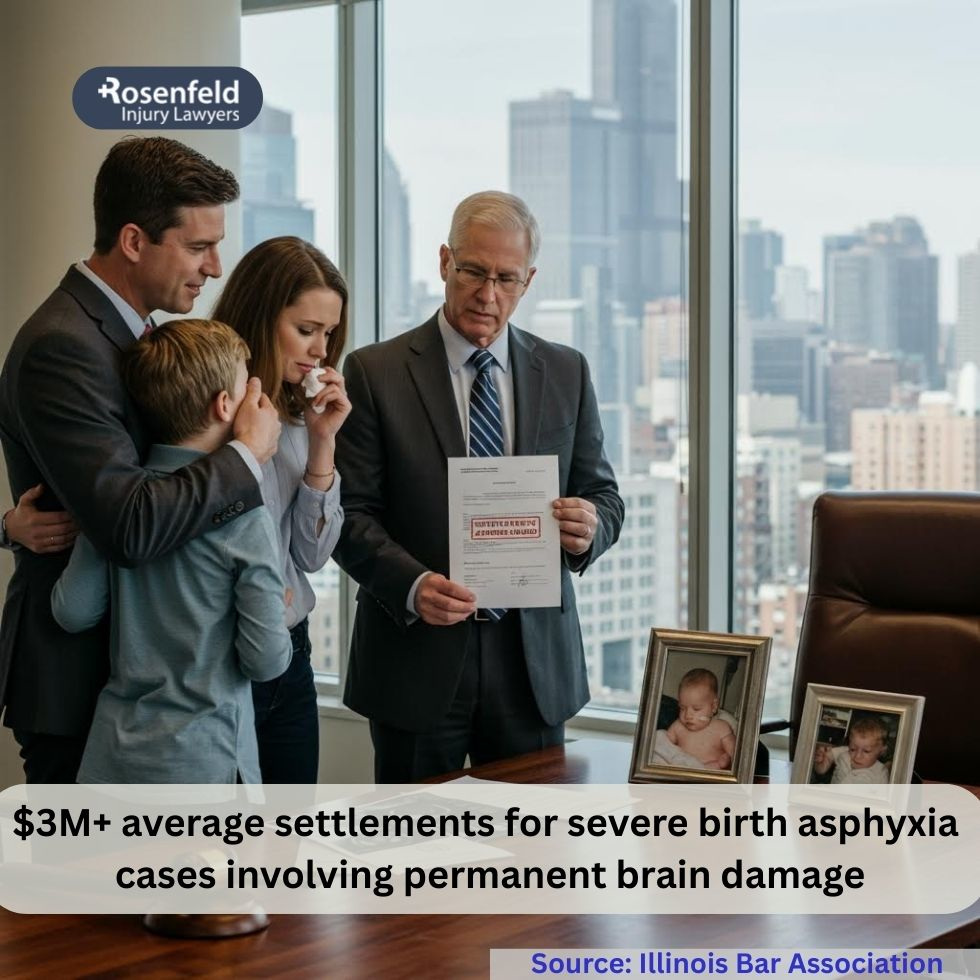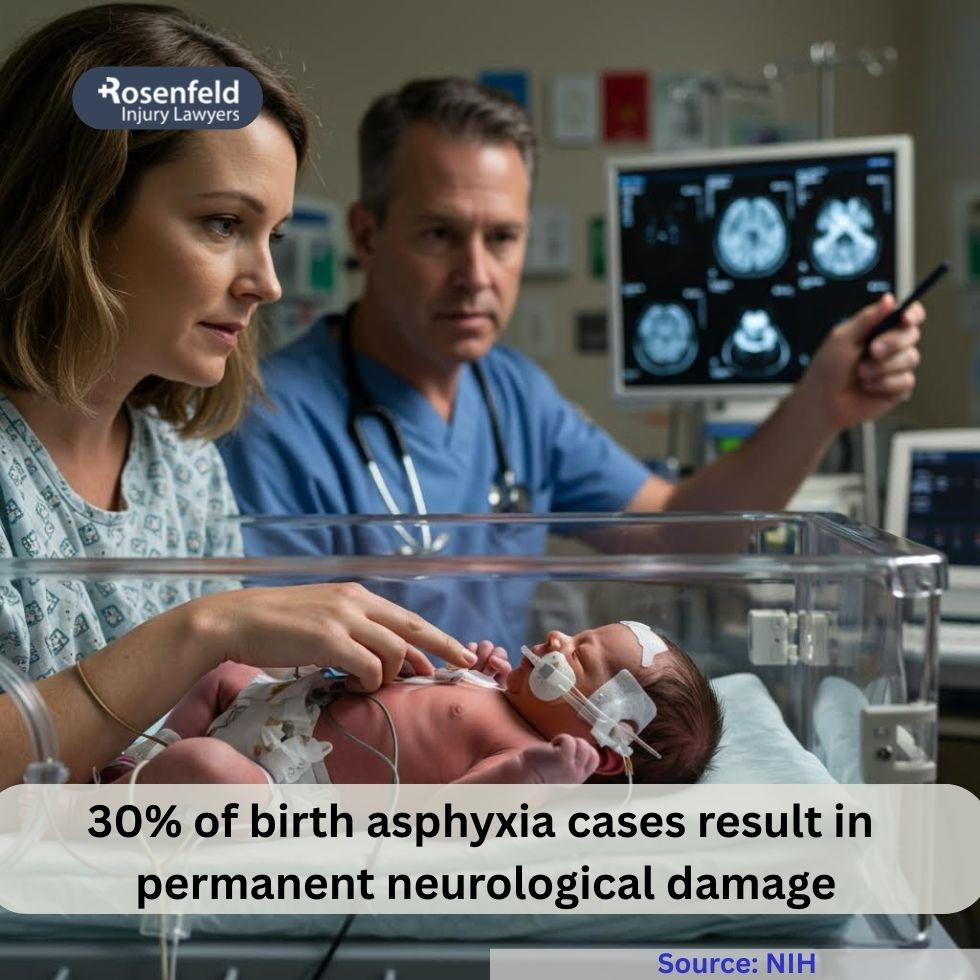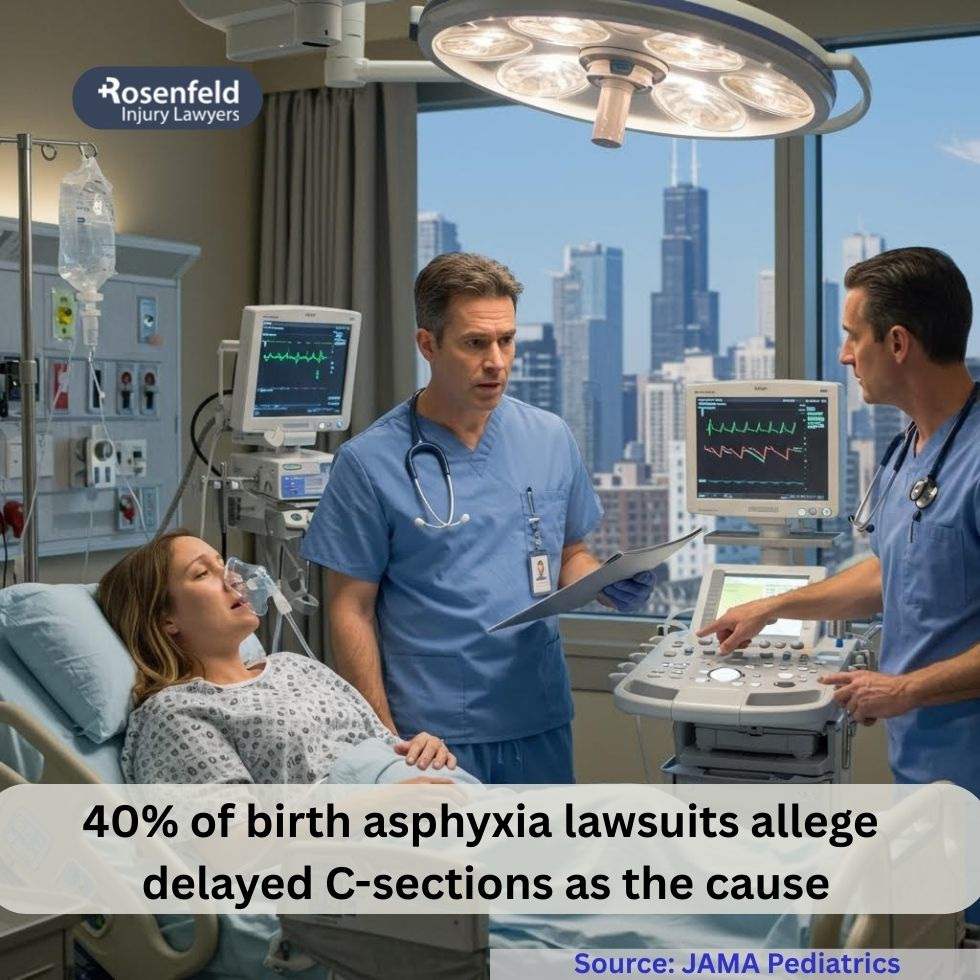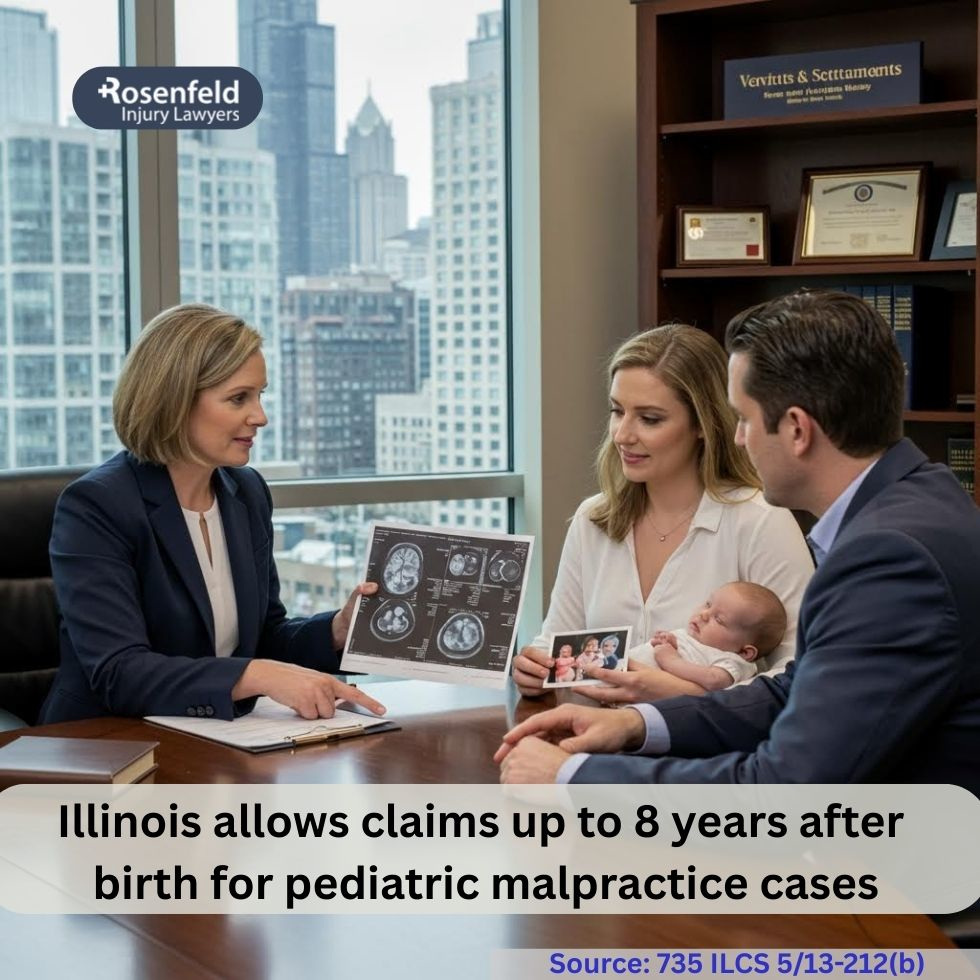- 24/7 Free Consultation: (888) 424-5757 Tap Here To Call Us
Chicago Birth Asphyxia Lawyer

Birth asphyxia is a serious medical condition that can lead to lifelong complications for a child and emotional and financial hardship for families. If medical negligence caused your child’s injury, a Chicago birth asphyxia lawyer from our team can help you pursue a birth injury claim to seek financial compensation for medical care and other expenses. Book a free consultation today!
What is Birth Asphyxia?
Birth asphyxia is a serious condition that occurs when a baby does not receive enough oxygen before, during, or immediately after birth. This lack of oxygen can cause severe injuries, including brain damage, cerebral palsy, and other developmental disabilities.
In some cases, birth asphyxia leads to hypoxic-ischemic encephalopathy (HIE), a condition that results in permanent brain damage. Without proper oxygen supply, a baby’s brain and other organs can suffer lasting harm, leading to intellectual disabilities, behavioral disorders, and lifelong medical challenges.
When birth asphyxia is caused by medical negligence, families may have legal options to seek compensation for their children’s injuries.

Causes of Birth Asphyxia
Birth asphyxia can occur for many reasons, including problems during pregnancy, labor, or delivery. In some cases, medical malpractice by healthcare providers worsens the situation, leading to severe injuries. Understanding the common causes of birth asphyxia can help parents determine whether medical errors played a role in the injury.
Problems with the Placenta or Umbilical Cord
The placenta and umbilical cord supply oxygen to a baby before birth. If these structures are damaged or compressed, the baby’s oxygen supply can be disrupted, leading to birth asphyxia.
Placental abruption, where the placenta separates from the uterus too soon, can cause severe oxygen deprivation. A nuchal cord, where the umbilical cord wraps tightly around the baby’s neck, can restrict blood flow. Umbilical cord prolapse, where the cord slips through the cervix before the baby, can also cut off oxygen.
These complications require quick intervention to prevent injuries like brain damage or hypoxic-ischemic encephalopathy.
Difficult or Prolonged Labor
A prolonged or complicated labor can increase the risk of birth asphyxia. Conditions like shoulder dystocia, where the baby’s shoulder gets stuck behind the mother’s pelvic bone, can delay delivery and lead to oxygen deprivation.
A long second stage of labor—when the baby is pushed through the birth canal—can also be dangerous, as extended pressure on the baby’s head may reduce oxygen flow.
If medical professionals do not act quickly in these situations, the baby can suffer permanent injuries such as cerebral palsy, developmental delays, or other brain injuries caused by prolonged oxygen deprivation.
Maternal Health Conditions
Certain maternal health conditions can increase the risk of birth asphyxia. Preeclampsia, a pregnancy complication marked by high blood pressure, can restrict blood flow to the placenta, reducing the baby’s oxygen supply.
Gestational diabetes can lead to excessive fetal growth, increasing the likelihood of delivery complications that cause asphyxia. Other conditions, such as infections or anemia, can also interfere with oxygen delivery to the baby.
Proper prenatal care and careful monitoring during labor are essential to preventing complications that could lead to serious birth injuries.
Medical Negligence
Medical negligence is a major factor in many birth asphyxia cases. If healthcare providers fail to monitor the baby’s heart rate properly, they may miss signs of fetal distress.
Delayed responses to complications—such as failing to perform an emergency C-section when needed—can cause severe injuries. Other medical professionals may make critical errors, such as misusing labor-inducing drugs, failing to address umbilical cord problems, or improperly using forceps or vacuum extractors.
When medical malpractice leads to birth asphyxia, families have the right to pursue a birth injury lawsuit to seek compensation for future medical needs.
Signs and Symptoms of Birth Asphyxia
Perinatal asphyxia can sometimes be detected during labor or immediately after delivery. Warning signs may indicate that a baby is not receiving enough oxygen, requiring immediate medical intervention. If medical professionals fail to recognize and address these symptoms, the risk of serious injuries like brain damage, cerebral palsy, and developmental disorders increases.

During Labor and Delivery
Certain signs during labor and delivery may indicate fetal distress, signaling that the baby is not receiving enough oxygen. Medical staff should carefully monitor these warning signs to prevent birth asphyxia:
- Abnormal fetal heart rate – An abnormally slow, fast, or irregular heart rate may indicate oxygen deprivation. Continuous fetal monitoring can help detect distress.
- Meconium aspiration – The presence of fetal stool in the amniotic fluid suggests that the baby may have experienced stress before birth. If inhaled, meconium can cause breathing difficulties and worsen oxygen deprivation.
Immediately After Birth
A baby affected by birth asphyxia may show apparent symptoms right after delivery. Signs of oxygen deprivation in a newborn include:
- Pale or blue skin color – A lack of oxygen can cause the baby’s skin to appear unusually pale or blue.
- Weak or absent breathing – The baby may struggle to breathe independently or fail to breathe altogether.
- Low heart rate – A slow heartbeat can indicate severe oxygen deprivation and requires immediate medical attention.
- Poor muscle tone – Babies affected by asphyxia may appear limp or have weak reflexes.
- Seizures – Seizures shortly after birth suggest possible brain injuries caused by oxygen deprivation.
Long-Term Effects of Birth Asphyxia
Birth asphyxia can lead to lasting complications, especially if the baby experiences prolonged oxygen deprivation. The severity of the effects depends on how long the child’s oxygen supply was restricted and how quickly medical professionals responded. Some children recover fully, while others face permanent disabilities that require lifelong medical care and support.
Hypoxic-Ischemic Encephalopathy (HIE)
Hypoxic-ischemic encephalopathy (HIE) is a serious type of brain damage caused by oxygen deprivation during the birthing process. HIE can result in long-term disabilities, including:
- Cerebral palsy – A condition affecting muscle control, coordination, and movement, often requiring physical therapy and assistive devices.
- Developmental delays – Children with HIE may struggle to reach milestones such as sitting, walking, or talking at the expected ages.
- Cognitive impairment – Reduced oxygen supply to the brain can impact memory, problem-solving skills, and overall intellectual abilities.
- Seizure disorders – Babies with HIE are at higher risk of epilepsy, which may require lifelong medication and monitoring.
Other Potential Complications
Aside from brain injuries, birth asphyxia can cause other long-term health problems, including:
- Hearing loss – Oxygen deprivation can damage the auditory system, leading to partial or complete hearing impairment.
- Vision problems – Some children develop vision impairments, including cortical blindness or difficulty processing visual information.
- Learning disabilities – Children who experience birth asphyxia may struggle with reading, writing, and comprehension, affecting their academic performance.

Legal Help for Birth Asphyxia Cases in Chicago
Families may need legal representation if they suspect medical malpractice played a role in their child’s birth asphyxia. Medical professionals are responsible for closely monitoring the mother and baby throughout pregnancy and delivery. When they fail to act appropriately, serious injuries can occur.
- Failure to properly monitor or respond to fetal distress – If doctors and nurses do not recognize warning signs like an abnormal fetal heart rate, they may miss critical opportunities to prevent oxygen deprivation.
- Failure to provide timely and appropriate interventions – Medical staff must act quickly when complications arise. Delayed decisions, such as not performing an emergency C-section when necessary, can cause permanent brain damage.
What a Chicago Birth Asphyxia Lawyer Can Do
A Chicago birth asphyxia lawyer can help families understand their legal options and pursue fair compensation. These cases often require extensive investigation and expert testimony to prove medical negligence. An experienced medical malpractice lawyer can assist by:
- Investigating the cause – Lawyers review medical records, labor and delivery reports, and interview witnesses to determine whether medical malpractice occurred.
- Gathering medical evidence – Collecting documentation, including fetal monitoring strips and hospital protocols, can help build a strong birth injury claim.
- Consulting with medical experts – Birth injury attorneys work with specialists to assess whether healthcare providers failed to meet the standard of care.
- Establishing liability – Proving that a doctor, nurse, or other medical professional acted negligently is essential for a successful birth asphyxia case.
- Negotiating with insurance companies – Lawyers negotiate with insurance companies to seek a fair settlement that covers medical bills, therapy, and long-term care.
- Filing a lawsuit – If a fair settlement is not possible, birth injury lawyers can take the case to court to fight for maximum compensation.
Seeking Compensation for Birth Asphyxia
Families facing the effects of birth asphyxia struggle with significant financial and emotional burdens. If medical malpractice contributed to the injury, parents may have the right to seek compensation through a birth injury lawsuit. A successful claim can help cover medical care, therapy, and other long-term needs.
Types of Damages
Under Illinois law, birth asphyxia claim can provide financial relief for various expenses related to the child’s injury, including:
- Medical expenses – Covers past and future medical bills, including hospital stays, surgeries, and specialist visits.
- Lost earning capacity – If a child’s disabilities prevent them from working in the future, compensation can account for lost income potential.
- Pain and suffering – Addresses the physical and emotional distress caused by brain damage, developmental delays, and other serious injuries.
- Cost of therapies and assistive devices – Includes physical therapy, occupational therapy, speech therapy, wheelchairs, and adaptive equipment.
- Home modifications – Covers necessary changes, such as wheelchair ramps and specialized bathroom equipment, to accommodate a child’s disabilities.
The Importance of Lifetime Care Costs
Children with permanent disabilities from birth asphyxia may require specialized care for the rest of their lives. Cerebral palsy, intellectual disabilities, and other developmental disorders often lead to ongoing medical treatment, therapy, and personal care assistance. The costs of in-home nursing, special education programs, and mobility aids can add up to millions of dollars over a lifetime.
A birth asphyxia lawyer will work with medical experts and financial specialists to estimate the full cost of lifelong care. Securing monetary compensation through a birth injury claim ensures that families have the resources to provide their children with the best possible quality of life.
Finding the Right Chicago Birth Asphyxia Attorney
Choosing the right Chicago birth injury lawyer is essential for families seeking justice and financial compensation for their child’s injuries. Birth injury cases are complex, requiring legal professionals with the right experience and resources. A qualified attorney can help families understand their legal options and fight for maximum compensation.
Experience and Expertise
Not all personal injury attorneys have the specialized knowledge for birth injury litigation. When searching for a lawyer, families should look for:
- Experience with birth injury cases – A lawyer familiar with medical records, fetal distress, and birth trauma can better establish liability.
- Medical malpractice expertise – These cases require knowledge of medical errors, hospital protocols, and how to prove negligence.
- Representation for children with disabilities – Lawyers who have worked with children facing permanent disabilities understand the long-term costs and challenges involved.

Compassion and Communication
Beyond experience, families should choose a lawyer who provides compassionate and clear support throughout the legal process. A reasonable attorney should:
- Understand the challenges of birth asphyxia – Lawyers who have handled birth asphyxia cases recognize the emotional and financial toll on families.
- Provide compassionate support – Dealing with a child’s injury is overwhelming, and a lawyer should approach the case with empathy and care.
- Communicate clearly and regularly – Families need updates on their cases and guidance through legal proceedings without confusing legal jargon.
Book a Free Consultation with Chicago Birth Injury Attorneys Near You!

If your child suffered birth asphyxia due to medical negligence, you deserve answers and financial support. The experienced Chicago birth injury attorneys at Rosenfeld Injury Lawyers are here to fight for your family’s rights.
We understand your challenges and are committed to helping you secure the fair compensation needed for medical care, therapy, and lifelong support. Our law firm works on a contingency fee basis, meaning you pay nothing unless we win your case.Call us at (888) 424–5757 or fill out our contact form to schedule a free case evaluation with an experienced personal injury lawyer in Chicago.
All content undergoes thorough legal review by experienced attorneys, including Jonathan Rosenfeld. With 25 years of experience in personal injury law and over 100 years of combined legal expertise within our team, we ensure that every article is legally accurate, compliant, and reflects current legal standards.







